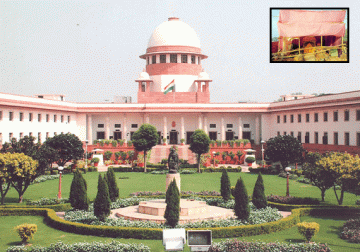New Delhi, Aug 8: The Supreme Court today admitted two more petitions challenging the Allahabad High Court verdict of three-way division of the disputed Ram Janmabhoomi-Babri Masjid site in Ayodhya.
A bench of justices Aftab Alam and R M Lodhat tagged the petitions with the main case on which it had stayed the operation of the September 30, 2010 verdict of the high court.
The latest petitions have been filed by Akhil Bhartiya Shri Ram Janmabhoomi Samiti and one Farooq Ahmed challenging the high court judgement, which the apex court had dubbed as “strange” as none of the parties had demanded partition of the land.
The Sunni Waqf Board today opposed the plea of Ram Janmabhoomi Samiti saying it was not a party before the Lucknow bench of the Allahabad High Court that had pronounced the Ayodhya verdict.
The bench said it will keep open the objection raised by the Sunni Waqf Board and consider it when it takes up the hearing.
The apex court on May 9 had dubbed as “strange” the high court's verdict of three-way division of the disputed Ram Janmabhoomi-Babri Masjid site in Ayodhya and had stayed its operation saying none of the parties had demanded partition of the land.
“A new dimension was given by the high court as the decree of partition was not sought by the parties. It was not prayed by anyone. It has to be stayed. It's a strange order,” the bench had observed.
It expressed surprise over how the high court could pass such an order when it was not prayed by anyone.
While ordering status quo at the site, which means that prayers at Ram Lalla's make-shift temple at the disputed site in Ayodhya would be going on as usual, the Court had restrained any kind of religious activity on the adjacent 67 acre land, which had been taken over by the Centre.
All the parties to the suit had expressed satisfaction over the Supreme Court's May 9 order. Counsel for various parties, including Lord Rama Lalla Virajman, Hindu Maha Sabha and Sunni Waqf Board, had expressed satisfaction over the apex court's interim order saying that none of the parties had sought division of the 2.77 acre land. The high court had directed that the controversial land of 2.77 acres at Ram Janmabhoomi-Babri Masjid be divided equally among Hindus, Muslims and Nirmohi Akhara, the parties to the suit.
Although the appeals filed by various Hindu and Muslim religious organisations pertained to only 2.77 acre of disputed land, the apex court bench, however, had ordered status quo on the 67 acre of land adjacent to the disputed site.
After the demolition of the mosque on December 6, 1992, the demonstrators created a makeshift temple. On January 7, 1993, the Congress government enacted the Ayodhya Act 1993 which preserved the status quo of the destroyed mosque and limited prayer on the disputed site.
The appeals have been filed by Nirmohi Akhara, Akhil Bharat Hindu Mahasabha, Jamait Ulama-I-Hind and Sunni Central Wakf Board, besides the one filed on behalf of Bhagwan Ram Virajman. PTI
Latest India News
